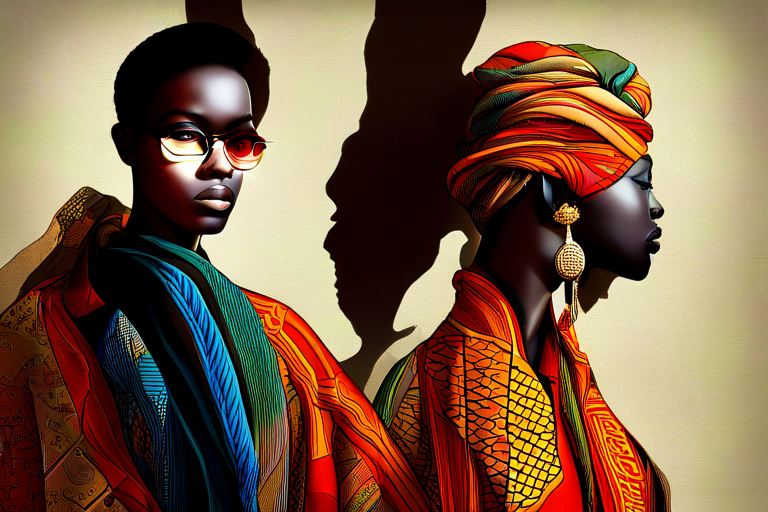 Traditional African fabrics, with their bold patterns, vibrant colors, and rich cultural significance, are playing an increasingly prominent role in modern fashion. Designers across the globe are reimagining these fabrics to create contemporary, stylish pieces that honor African heritage while appealing to a global audience. From Ankara to Kente and Aso-oke, these textiles are being transformed into high-fashion statements, bridging the gap between tradition and modernity.
Traditional African fabrics, with their bold patterns, vibrant colors, and rich cultural significance, are playing an increasingly prominent role in modern fashion. Designers across the globe are reimagining these fabrics to create contemporary, stylish pieces that honor African heritage while appealing to a global audience. From Ankara to Kente and Aso-oke, these textiles are being transformed into high-fashion statements, bridging the gap between tradition and modernity.
Ankara: The Versatile Print Taking Over the World
Ankara, also known as African wax print, is one of the most widely recognized African fabrics. Known for its bright colors and intricate patterns, ankara is used in everything from traditional garments to cutting-edge modern fashion. Its versatility has made it a favorite among both African and international designers.
In the past few years, ankara has been seen on international runways and in the collections of high-fashion brands. Designers like Lisa Folawiyo, known for her chic, contemporary take on ankara, have helped elevate the fabric from local markets to global fashion capitals. By adding embellishments, mixing prints, and creating modern silhouettes, Folawiyo and others are showing the world that ankara can be as luxurious and fashionable as any other high-end fabric.

Kente: The Pride of Ghana in Global Fashion
Kente cloth, traditionally worn by royalty in Ghana, is another African fabric making waves in modern fashion. Known for its distinctive woven patterns and bright colors, kente holds deep cultural significance and symbolizes wealth, history, and heritage. While it remains a symbol of prestige in Ghana, it is now being incorporated into contemporary fashion, where its vibrant designs add a bold statement to modern clothing.
Designers like Osei-Duro and Christie Brown have embraced kente, reworking the fabric into stylish dresses, jackets, and accessories that appeal to both African and global audiences. The blending of traditional handweaving techniques with modern designs allows kente to maintain its cultural significance while finding new life in the global fashion scene.
Aso-Oke: From Nigerian Ceremonies to High Fashion
Aso-oke, a handwoven fabric from the Yoruba people of Nigeria, is traditionally worn during special ceremonies such as weddings and coronations. Known for its thick texture and often metallic threads, aso-oke is considered a prestigious fabric. In recent years, Nigerian designers have transformed aso-oke from a ceremonial cloth into a key element of modern fashion.
Designers like Kenneth Ize, who is known for his innovative use of aso-oke, have brought the fabric to international runways, including Paris Fashion Week. Ize reimagines the fabric by using it in contemporary cuts and styles, making it accessible for everyday wear while maintaining its cultural integrity. His work has helped highlight the craftsmanship behind aso-oke and bring Nigerian heritage to a global audience.

Shweshwe: South Africa’s Iconic Fabric in Contemporary Fashion
Shweshwe, a fabric known for its small, intricate geometric patterns, has long been a staple in South African fashion. Originally introduced by European settlers, shweshwe has been adopted and transformed into a uniquely South African fabric, often used in traditional dresses and skirts.
Today, designers like Laduma Ngxokolo of Maxhosa Africa are reinterpreting shweshwe in bold, modern ways. Ngxokolo’s use of the fabric in knitwear and high-fashion pieces has not only revitalized shweshwe but also brought it to a global audience. His work celebrates Xhosa culture while showing how traditional textiles can be used in innovative, contemporary fashion designs.
The Role of Traditional Fabrics in African Fashion’s Global Expansion
As African designers gain international recognition, traditional fabrics are playing a central role in the global expansion of African fashion. These textiles are more than just fabrics—they are expressions of identity, culture, and history. By integrating them into modern fashion, designers are telling stories that resonate with both African and global audiences.
Global celebrities and influencers are also embracing these fabrics, wearing outfits made from African textiles to major events and red carpets. This visibility is helping to push African fashion into the mainstream, while also sparking a greater appreciation for the craftsmanship and cultural significance behind these fabrics.

Traditional Meets Modern: A New Narrative in Fashion
The fusion of traditional African fabrics with modern fashion represents a new narrative for African fashion. Designers are not just creating clothes; they are creating a movement that celebrates African heritage while looking forward to the future. This blend of the old and new allows African fashion to stand out in the global fashion industry, offering something truly unique and authentic.
As more designers experiment with traditional African fabrics, the possibilities for creativity and innovation continue to grow. Whether it’s through high fashion, streetwear, or sustainable fashion, traditional African textiles are becoming a key part of the global fashion dialogue, ensuring that Africa’s rich cultural history remains alive and relevant in today’s fashion world.
Ennywealth



